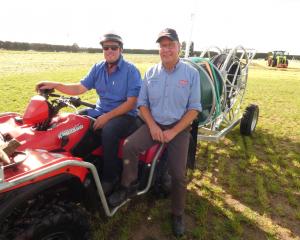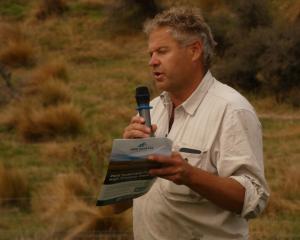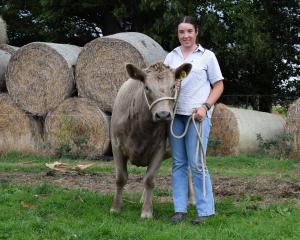
Tracy and Andrew Paterson have been on the land since 2001 and were recently named Otago’s winner of the Environmental Trust awards.
However, becoming award winners did not change their sentiment, one they believed they had in common with most New Zealand farmers.
"Farmers have always been good stewards of the land. You live in your house, but for people the farm is their home and their home extends well beyond the four walls of the house they live in. They feel very protective of it.
"A house is a house, but your land is something you put your feet on and it is an extension of who you are."
Before they moved to the farm owned by Andrew’s parents, Hilary and Martin, the couple worked in London and Europe in human resources and accounting.
Mrs Paterson went on to become a lawyer when they moved back to Central Otago 24 years ago.
Third-generation farmers, their goal is to leave the land they took over in better condition for the next generation.
This has meant fencing off and creating 20ha of wetlands, making sure the 132ha of regenerative totara has room to thrive, and testing the water quality on the farm, to keep themselves in check.
The independent testing which they have done for several years is showing water in better condition as it leaves the station, compared with on arrival.
"It shows that what we are doing in farming isn’t making the water quality worse. It is keeping an eye on things and making sure we are doing the right thing.
"At the end of the day it is a stock exclusion side of things and protecting those areas."
The Patersons are exploring hydro-electric and solar power generation to enhance the property’s resilience.
All the while they are still able to run 22,000 Polwarth sheep — supplying their fine wool for use in high-end brands — plus finishing lambs. In addition, they run 1100 Hereford cattle for beef, and derive income from a Polwarth stud.
They have invested heavily in irrigation, fencing, and pasture development, plus built upon the already well-established stud programme.
The totara growing on its own also displays the farm is running the correct amount of stock units per hectare, she says.
"Some of the trunks up there are huge. They would be hundreds of years old. The birds eat the seeds and fly along, and the rest happens."
The Patersons believe what they are doing is not uncommon across New Zealand farms.
"We were up against some phenomenal farmers and the calibre and stewardship that was shown was incredible."
This week, Earth Day was marked.
Mrs Paterson says farmers are leading the way because they have the land mass to do it.
"Every little bit helps. The smallest thing you do in your own world has a ripple effect and I think we need to be celebrating the good things farmers are doing."















